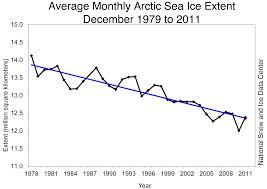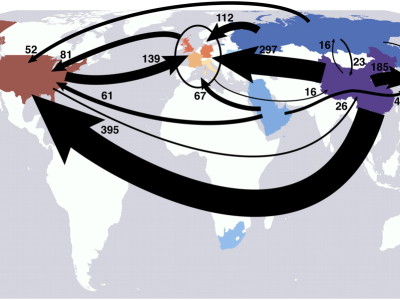Is Climate Change a Bulldozer or Bullet Train?
How fast will climate change happen? Maybe faster than we expect, according to the National Academy of Sciences.
We're in the early stages of climate change -- just how much depending in large part on whether we control our emissions. But how quickly will this happen? Is it a bulldozer we can dodge or a bullet train that's too fast to avoid? That makes a lot of difference in terms of our ability to adapt to climate change. A recent report from the National Research Council points out that we're already seeing fast changes driven by climate in terms of the rapid disappear...
CONTINUE READINGWhat are California Legislators Thinking About Cap-and-Trade?
CA Senate Hearing at UCLA Focuses on Ways to Spend Auction Revenue
Today, UCLA's Emmett Center and IOES hosted a hearing of the Senate Select Committee on Climate Change and AB 32 Implementation with Senators Pavley, Correa, de Leon, deSaulnier, Lieu, and Assemblymember Bloom attending. The hearing featured testimony on climate science, on AB 32 implementation, and on opportunities to invest revenue from the state's cap-and-trade auctions in ways that create jobs, reduce pollution, and strengthen communities. What drew the legisl...
CONTINUE READINGCOPs: The Erratic Evolution of Global Climate Policy
The latest Conference of the Parties (COP) in Warsaw didn't make headlines -- more like footnotes. Two things have become clear. First, the formal UN negotiations are only part of the transnational development of climate policy. And second, the UN negotiations are moving slowly and fitfully, but they are making progress. Neither of these things should be surprising. The UN mechanism is very cumbersome, and it would be crazy to put all our faith in that one ...
CONTINUE READINGJeudi Gras – The Great American Holiday
Jeudi Gras means"Fat Thursday" in English. It would probably be a better name for the holiday than the current one. Let's face it: for most of us, the day involves a bit of giving thanks and a much larger amount of pigging out like there's no tomorrow. As the NY Times points out, this wouldn't be great cause for concern except that we have such a large obesity problem to begin with: All told, more than one in three Americans is obese, a fact that as of five y...
CONTINUE READINGCalifornia High Speed Rail Slowed by Court Decisions
Judge rules the train needs a new business plan and project-level environmental review
California Superior Court Judge Michael Kenny dealt two setbacks to high speed rail yesterday that are likely to delay the project significantly. First, Judge Kenny ruled that the state committee that approved the disbursement of bond money for the project acted without sufficient evidence to justify the disbursal. California law empowers the High-Speed Passenger Train Finance Committee to authorize the release of $8 billion of the bond funds that voters approved...
CONTINUE READINGThe Significance of EPA’s Proposed Power Plant Standards
Although they won't have immediate impacts, EPA's proposed rules for new coal plants will indirectly help shape the future of the industry.
There's an uproar over EPA's proposed rules for CO2 emissions from new coal plants, even though no one expects anyone to build a new coal plant for at least a decade. I've argued (here and here) that the industry won't have standing to challenge the rules because they won't have any imminent impact. In fact, a new report from the Congressional Research Service calls the rules "symbolic," which bolsters my standing argument. But the body of the report also sugge...
CONTINUE READINGPassing Gas
A better accounting of GHGs can improve the climate discourse
The tendency to divide global GHG emissions by country is a product of the well-mixed dispersal of most of warming gases, and the international politics that attach to cross-border pollution. A country’s emission numbers imply accountability and culpability, and frame the discourse on how to respond. Going forward on policymaking, it’s worth looking at how these emissions are calculated, and whether the numbers cited accurately reflect international accountabil...
CONTINUE READINGThe Filibuster and the Environment
In the short run, limiting the filibuster will strengthen the hands of environmental regulators. What about the long run effects?
The filibuster arguably served a useful function when it allowed the minority to block action in extraordinary cases where its views were especially intense. It became no longer tolerable when it became a routine barrier to Senate action. Last week, the Senate abolished filibusters for nominations (except the Supreme Court). What does this mean for environmental regulation? The vote last week was along party lines. Yet, although Republicans are protesting loudly, ...
CONTINUE READINGUC Berkeley / UCLA Law Report on California Renewable Energy Policies Beyond 2020
Joint law school report will be discussed at a lunchtime forum today at UCLA Law
California is among the world's leaders in deploying renewable energy, with the state on pace to meet its target of achieving 33% of its energy from renewable sources like the sun and the wind by 2020. But the success may ironically be contributing to a stalled in-state market for more renewable power. Given the amount of renewables in the pipeline, utilities now have little incentive to procure more. To address the challenge and offer policy solutions for California'...
CONTINUE READINGState Releases New Fracking Regulations Amid SB 4 Criticism, Controversy
DOGGR also wades into CEQA while environmental community questions wisdom and effects of new State law
California's Division of Oil, Gas & Geothermal Resources (DOGGR) has released its proposed regulations governing hydraulic fracturing pursuant to Senate Bill 4, controversial legislation signed into law this September. DOGGR's November 15 public notice begins its formal rulemaking process and marks the start of a 60-day public comment period for the new rules. DOGGR also filed its Notice of Preparation for a statewide Environmental Impact Report required to be conduc...
CONTINUE READING













